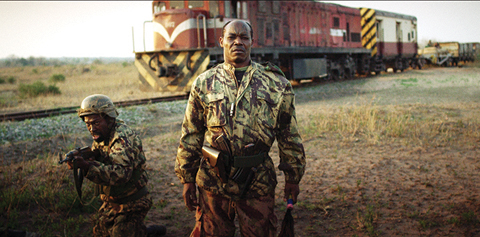 Train of Salt and Sugar
Train of Salt and SugarBrazilian-born helmer Licinio Azevedo's powerful Mozambican war drama, "Train of Salt and Sugar," was named best film at the first Joburg Film Festival, which wrapped Nov 5 in Johannesburg. Set in Mozambique in the 1980s, during the country's brutal civil war, pic offered a humane portrait of the risks ordinary people faced as they struggled for survival, with the jury noting how it "triumphs in showing the resilience of the human spirit." Accepting on behalf of Azevedo, producer Elias Ribeiro expressed his gratitude to the Johannesburg audiences, saying, "We were showered with love this whole week."
The award for best African film went to Zola Maseko's "The Whale Caller," an adaptation of South African scribe Zakes Mda's novel about an unlikely love triangle between a man, a whale, and the woman who comes between them. Praising its "fable-like quality" while drawing a contrast to the more conventional output of a South African film biz which typically hews to Hollywood-style storytelling, the jury singled out its "uniqueness, poetry, and strength of imagination."
Hard-hitting portrait
Veteran documentarian Rehad Desai took home honors for best South African film for "The Giant is Falling," a hard-hitting portrait of the country's ongoing political turmoil, which followed on the heels of his Emmy-winning "Miners Shot Down." Accepting the award, which came with a cash prize, Desai deadpanned, "I could pay my children's school fees now. Drinks are on me tonight." A jury special mention was also given to "The Wedding Ring," by Rahmatou Keita, of Niger, for its moving tale of a young woman suffering from the pain of lost love.
For a festival meant to showcase the dynamism of South Africa's cultural and economic engine, it was a sluggish closing night, as auds trickled in for a brief awards ceremony that was followed by the African premiere of Nate Parker's "The Birth of a Nation." Perhaps it was a fitting way to wrap the first edition, with fest consultant Lesedi Oluko Moche, the closing night's emcee, alluding to "the bumpy and rough edges" of a festival that seemed at times to be learning on the fly. "There were cinemas packed with people and some packed with crickets," Moche acknowledged. "We've had exhilarating highs and devastating lows."
With empty seats scattered throughout the theater, it was a night marked by absence. Many in the country's tight-knit film industry were still reeling from the passing of veteran producer Junaid Ahmed, who died Thursday in Durban at the age of 57. Condolences poured in on social media throughout the weekend, with actress Thishiwe Ziqubu writing on Twitter, "We are richer having had him in our lives." Moche also took time to acknowledge what she called "the elephant in the film industry room," tackling the issue of women's representation that was a frequent topic in private conversations in Johannesburg throughout the week.
Strong female leads
Pointing to a lack of diversity in the festival program, she called out her industry colleagues to open the door for more female directors, as well as films with strong female leads. "The Joburg Film Festival is not exempt from the obligation of coming to the party," she said. "We should and we can do better." Moche then singled out the female helmers in attendance, praising "their insistence on telling stories in an industry that tells you should not." Despite the bumps along the way, the festival wrapped with a sense of conviction that this cosmopolitan city offers a unique potential to become a crossroads of the African and international film worlds.
The decision to pair the fest's first edition with Discop Africa, the continent's largest TV content market, also signaled the intent of the organizers and the local government to use the JFF as a driver to grow the South African film biz. As the festival turned its eyes toward next year's second edition, there was no small sense of triumph at a time when the host country has been reeling from a string of political and economic crises. "One of the many successes of the Joburg Film Festival is that it happened," said Moche, to rousing applause.-Reuters










